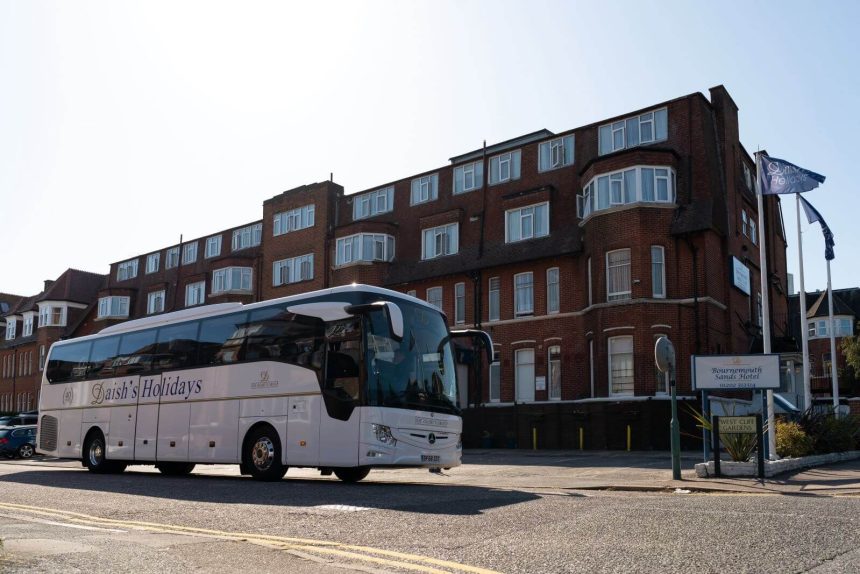Businesses operating coach tours to the Bournemouth, Christchurch and Poole (BCP) area could face additional layout this summer following news that hoteliers there voted to introduce a £2 per night per guest levy from 1 July.
After Manchester introduced a similar tax last year, the south Dorset tourist hotspot will be the first coastal area to follow suite.
Introduced via the BCP Accommodation Business Improvement District (ABID), the fee will be charged only by the approximately 70 hotels in the unitary authority area with a rateable value of more than £40,000. The hope is to raise £2 million per year over the next five years to cover marketing to boost visitor numbers, securing major events, research and attracting outside investment.
Following a 41% turnout in a ballot of business rate payers, the levy was approved narrowly with 16 votes in favour to 15 against.
BCP ABID says the charge is necessary to cover a shortfall in tourism funding from BCP Council and defends the late notice which may cause operators to be out of pocket.
ABID Chair Rosie Radwell says: “Whilst we appreciate it is short notice for all guests, this has come about as a result of a funding shortage at BCP council, who ceased all funding for tourism and destination marketing in BCP from 31 March 2024.
“The tourism industry was made aware of the potential that funding could be pulled in November 2023, but this was not confirmed until February 2024.
“As the third largest industry in our country, it is such a shame that we get hit from all sides; however, the effect of this levy can be compared to a VAT increase which would be passed on to the guests – the hotels or coach operators would not be the ones to be hit financially.”
In a feature published in the May edition of routeone, UK Coach Operators Association Managing Director Peter Bradley – speaking ahead of the vote results announcement – says operators suffer from insufficient notice when it comes to tourist taxes.
He says: “There needs to be consultation in advance of doing it and that needs to be with a clear timescale.
“Obviously, if operators have put their brochures to print up to a year before some of those holidays take place, most of them don’t want to change their prices afterwards. Therefore, if suddenly tourist taxes are put in, it’s the operator that has to bear the cost of that and it’s quite a large outlay for them.”
However, Ms Radwell, who is also Managing Director of Marsham Court Hotel in Bournemouth, insists the levy is needed to boost tourism in the area.
“We have had to come up with alternative ways to fund marketing or promotion, for our area to be able to build on its reputation as a clean, green, and safe conurbation, to fund marketing campaigns and events for all seasons, giving guests a reason to visit.
“We cannot rely on our picturesque Jurassic coastline and beaches alone. We need to encourage guests to visit for the benefit of all involved in the tourism industry, and there are no other funds available to be able to do this.
“The levy will help to fund activities to help continue the great collaborative approach we have to the travel trade and to hopefully help us with the expansion of creating an LVEP (Local Visitor Economy Partnership) for the wider Dorset area, so that we will continue be promoted under Visit England, helping secure the future of our destination.
“We will work closely with coach operators, and we can either collect the tourism levy direct from their guests on arrival or they can collect the monies from their guests and pay this before arrival. Each coach operator or group will be able to decide what suits their guests best.”
Tourism taxes are more common in continental Europe and Ms Radwell believes they could become the norm in the UK in coming years.
“There are potentially 20 other destinations looking at implementing this in their area and we feel that, over the next three to four years, it will become standard in our country, similar to Europe and the USA, which charge city taxes.
“The late notice is not ideal but, with all group travel, most of it is booked 12-18 months in advance and we need to collect now so we can arrange a calendar of events to help attract future business for our area.
“The charge is intended to be passed on to the guests and not the coach operators… For a four-night stay in a hotel in our area, the charge will be less than £10. This money will be spent by the [ABID] Board to enhance our offering and to plan for the future, and the Board is made up with the majority of hoteliers and will be led by our industry to the benefit of all.”
For more on tourist taxes, see the latest issue of routeone or read the web version of the article here.



























